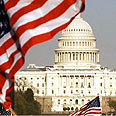
Iran's financial partners would be hit with new unilateral sanctions under draft legislation proposed by US House of Representatives and Senate negotiators, lawmakers announced on Monday in a move aimed at curbing Tehran's nuclear program.
The legislation would effectively deprive foreign banks of access to the US financial system if they do business with key Iranian banks or its Revolutionary Guard Corps.
The proposal, which also includes sanctions on Iran's gasoline suppliers, was announced in a joint statement by Senator Chris Dodd and Representative Howard Berman, both Democrats. It is being circulated among House and Senate negotiators and will have to pass both chambers to become law.
Key lawmakers want Congress to pass the bill by early next month to tighten existing US sanctions on Iran and build on sanctions agreed by the UN Security Council and European Union.
White House Press Secretary Robert Gibbs said the Obama administration appreciates that House and Senate leaders have forged a "strong bill" that builds on the UN sanctions.
"We will continue to work with the Congress over the coming days as it finalizes work on this important bill, and in our ongoing efforts to hold Iran accountable," Gibbs said in a statement.
There is bipartisan support for the goal of pressuring Iran to stop its nuclear work, which Washington suspects is aimed at bomb-making. But some Republicans thought the draft looked weaker than they had hoped, a Republican aide said.
"The act presents foreign banks doing business with blacklisted Iranian entities a stark choice -- cease your activities or be denied critical access to America's financial system," according to a summary of the proposed legislation.
The act will also hold US banks accountable for actions by their foreign subsidiaries, the summary said.
Question of enforcement
US companies are already prohibited from doing business with Iran. Foreign companies with big investments in Iran's energy sector also can be sanctioned under current US law.
But many US lawmakers charge this has not been enforced, with presidents of both parties reluctant to sanction companies hailing from trading partners and allies.
The new proposal includes a provision that would allow the president to waive for a year sanctions on companies from countries that cooperate with multilateral efforts to keep Iran from getting nuclear weapons.
A congressional aide said President Barack Obama's administration had wanted upfront exemptions for the "cooperating" countries, but lawmakers insisted on allowing only temporary, case-by-case waivers on companies from those countries.
A number of companies worldwide, such as Italy's oil and gas company Eni and French energy giant Total have been backing away from business with Iran amid the US drive to isolate Iran, and US lawmakers hope to deter more.
Suppliers of gasoline to Iran could face a variety of sanctions under the draft bill, including prohibitions on access to the US banking system, property transactions and foreign exchange in the United States.
Iran depends on gasoline imports because it has insufficient refining capacity. Many US lawmakers say cutting off the gasoline supply would be the best way to pressure the regime into giving up its nuclear program. Iran says the program is for peaceful purposes.
The draft legislation also would impose "significant financial penalties and travel restrictions" on abusers of human rights in Iran, the summary said. They could be banned from getting US visas or have US financial assets frozen.















